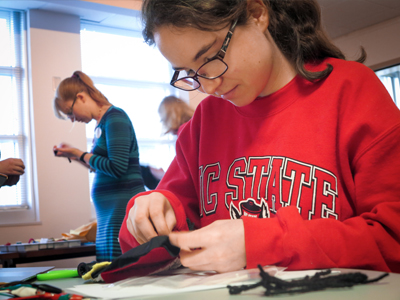
Women in STEM Build Community (and Circuits) in E-Textiles Workshop

To build diversity and and inclusiveness into the fabric of our Makerspace community, the NCSU Libraries and NC State’s Women in Science and Engineering piloted an entertaining and skill-building program -- a “D-I-WISE” electronics and textiles workshop for women in STEM.
The NCSU Libraries Makerspace program and the maker movement emphasize the democratization of access to tools and technology for social change, design, and innovation. Creating inclusive and welcoming environments for women in technology-focused spaces is a high-profile issue within the maker community. (Check out this much-discussed 2013 Make Magazine article “Where Are the Women in Makerspaces?” for a taste.)
Anecdotal evidence and workshop survey responses at the NCSU Libraries Makerspace suggested that the same gender imbalance exists on our campus. And with the new D. H. Hill Library Makerspace opening in the fall of 2015, we had several goals:
- We wanted to build diversity into the program from the very beginning - indeed, even before the official opening.
- We wanted to work with groups on campus to develop a program targeting women students in Science, Technology, Engineering, and Mathematics (STEM) fields and beyond, in order to provide a welcoming and inclusive introduction to the space.
- We wanted to introduce women to the resources available in the Makerspace program and to train additional interested female student staff and librarians lead Makerspace workshops with confidence.
- We wanted to create a women-centered workshop where library staff and students could work together to learn more about e-textiles (e-textiles involve electronic devices worked into garment designs.)
 Women in Science and Engineering (WISE) students select LED lights, conductive thread, and decorations for their LilyTwinkle projects.
Women in Science and Engineering (WISE) students select LED lights, conductive thread, and decorations for their LilyTwinkle projects.
As a first step, we collaborated with Dr. Kathy Titus-Becker from NCSU’s Women in Science and Engineering (WISE) village, a supportive living and learning community on campus for women in STEM, to develop a pilot workshop for WISE members and others. Dr. Titus-Becker notes that WISE is an important resource for young women in STEM fields because of the challenges these students face, including “being underrepresented in class as well as their discipline, being ignored or silenced by the majority, battling self-confidence issues, and feeling targeted because of their gender and/or other intersectionalities (such as race, religion, sexual orientation, etc).” Creating programming that not only builds skills and portfolios, but also community and self-confidence, is a critical part of WISE’s mission.
We termed the workshop “D-I-WISE,” a nod the the Do-It-Yourself or DIY movement. Using the LilyTwinkle, an Arduino microcontroller optimized for e-textiles projects, we planned a workshop at D. H. Hill Library where students would combine circuits and sewing to “light up their lives” by sewing the LilyTwinkle and programmable LED lights into fabric.
The LilyTwinkle Arduino is a platform that allows users to design circuits that perform both input and output functions. Users learn some of the fundamentals of electronics by drawing simple schematics and using conductive thread to connect a sewable power supply to LED lights to create a circuit. In addition to learning basic skills in circuitry and sewing to expand their research and design toolkits for prototyping, students at the workshop were able to work on a project that illuminated the real life applications of such technology.
 Workshop attendees drew and consulted their own circuit diagrams to create light-up projects using a microcontroller, battery pack, and LED lights.
Workshop attendees drew and consulted their own circuit diagrams to create light-up projects using a microcontroller, battery pack, and LED lights.
Students were encouraged to bring their own projects to deck out with programmable lights, and we also provided felt templates to create light-up bookmarks and stuffed animals. While enjoying dinner provided by WISE, our workshop instructors introduced the LilyTwinkle Arduino platform. We then split up into groups, and two instructors taught some basics of sewing with conductive thread, while other instructors worked with students to construct circuit diagrams for their projects and test connections using alligator clips. An open project time followed, where students prototyped and constructed their own projects.
 Attendees learned the basics of both circuits and sewing.
Attendees learned the basics of both circuits and sewing.
Twenty-one people participated in the April 6 workshop - 20 women and 1 man, all students at NC State. The session was open to all NC State students, staff, and faculty, but we did target WISE members through Kathy. “The workshop was a great example of two seemingly unrelated campus partners who came together with a common goal to help students,” noted Kathy. “The students had a great time as evidenced by how long they stayed. They enjoyed the actual project and built community at the same time.”
Sophomore and electrical engineering student Fatima Fatajo, who planned to sew LED lights into her hijab head covering, was glad that even with her limited experience with the platform, staff were able to guide her to design her circuit and sew her project. She noted that the chance to prototype alongside women in her cohort who share similar majors and passions made the experience more memorable. “I enjoyed hearing about my fellow WISE women's designs and ideas,” she said.
 Attendee Fatima Fatajo used the open project time to build LED lights into her hijab head covering.
Attendee Fatima Fatajo used the open project time to build LED lights into her hijab head covering.
Building diversity into physical spaces, programming, and the use of lending technology is a challenge. We have found, though, that building strong relationships with campus groups, students, and interested staff is a way to foster an inclusive environment for all to learn, prototype, and play.





